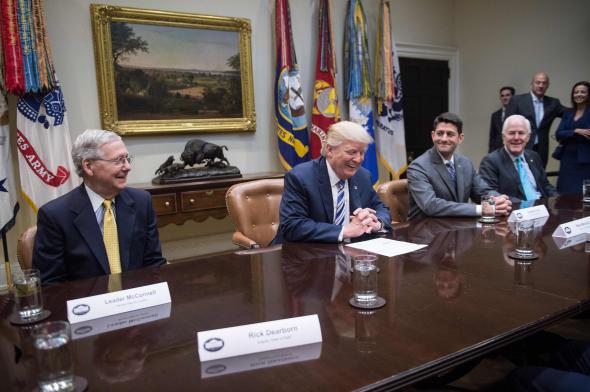The Congressional Budget Office analysis of the Senate health care bill has arrived. Your topline takeaways:
- The CBO estimates that 15 million more Americans would be uninsured next year, 2018, under the Senate bill than would be uninsured under existing law (i.e. the Affordable Care Act). However, the analysis notes that this is “primarily because the penalty for not having insurance”—the individual mandate—would be eliminated under the draft of the Senate law that the CBO evaluated. (Young and/or generally healthy individuals would thus have less of an incentive to cover themselves.) A so-called “lock out” mechanism that would replace the mandate is being added to the bill; Slate’s economics columnist described it as “politically suicidal,” so there’s that.*
- Speaking of political suicide, because the bill also eliminates the mandate that certain employers cover their employees, the CBO estimates that four million individuals who currently have employer-provided insurance will lose it next year.
- By 2026, the estimate says, 22 million fewer Americans will be insured than would have been under current law. That total end number, the CBO says, would be attributable in part to “lower spending on Medicaid and substantially smaller average subsidies for coverage in the nongroup market,” a.k.a. the Obamacare exchanges.
- Says the CBO: “By 2026, among people under age 65, enrollment in Medicaid would fall by about 16 percent.” An estimated 4 million Americans would lose Medicaid coverage next year.
- The CBO estimates that the bill cuts $771 billion in Medicaid spending and $408 billion in exchange-subsidy spending. It also includes the elimination of $172 billion in taxes on individuals who earn more than $200,000 a year.
- In broad terms, the bill would cause the average premium to rise across the board in the near term, then fall in the long term—but only because deductibles will rise accordingly and because old and/or sick individuals will find coverage to be so expensive that they end up not buying into the market. “Most people purchasing [insurance on the Obamacare exchanges] would have higher out-of-pocket spending on health care than under current law,” the CBO writes. Our aforementioned economics/health care specialist describes it like so: Under the Senate bill, “The young pay slightly less, the middle-aged pay the same, and the old pay immensely more.”
More to come on this story tonight and in the coming days!
*Correction, June 26, 2017: This post originally suggested a six-month lockout penalty wasn’t included in the CBO analysis. It was.
